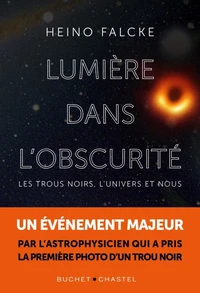As featured in THE EDGE OF ALL WE KNOW - the new Netflix documentary about Black HolesFor readers of Stephen Hawking, a fascinating account of the universe from the perspective of world-leading astrophysicist Heino Falcke, who took the first ever picture of a black hole.10th April 2019: a global sensation. Heino Falcke, a man "working at the boundaries of his discipline and therefore at the limits of the universe" had used a network of telescopes spanning the entire planet to take the first picture of a black hole.
Light in the Darkness examines how mankind has always looked to the skies, mapping the journey from millennia ago when we turned our gaze to the heavens, to modern astrophysics. Heino Falcke and Jorg Romer entertainingly and compellingly chart the breakthrough research of Falcke's team, an unprecedented global community of international colleagues developing a telescope complex enough to look directly into a black hole - a hole where light vanishes, and time stops.
What does this development mean? Is this the beginning of a new physics? What can we learn from this about God, the world, and ourselves? For Falcke, astrophysics and metaphysics, science and faith, do not exclude one another. Black Hole is both a plea for curiosity and humility; it's interested in both what we know, and the mysteries that remain unsolved.
As featured in THE EDGE OF ALL WE KNOW - the new Netflix documentary about Black HolesFor readers of Stephen Hawking, a fascinating account of the universe from the perspective of world-leading astrophysicist Heino Falcke, who took the first ever picture of a black hole.10th April 2019: a global sensation. Heino Falcke, a man "working at the boundaries of his discipline and therefore at the limits of the universe" had used a network of telescopes spanning the entire planet to take the first picture of a black hole.
Light in the Darkness examines how mankind has always looked to the skies, mapping the journey from millennia ago when we turned our gaze to the heavens, to modern astrophysics. Heino Falcke and Jorg Romer entertainingly and compellingly chart the breakthrough research of Falcke's team, an unprecedented global community of international colleagues developing a telescope complex enough to look directly into a black hole - a hole where light vanishes, and time stops.
What does this development mean? Is this the beginning of a new physics? What can we learn from this about God, the world, and ourselves? For Falcke, astrophysics and metaphysics, science and faith, do not exclude one another. Black Hole is both a plea for curiosity and humility; it's interested in both what we know, and the mysteries that remain unsolved.

 , qui est-ce ?
, qui est-ce ?